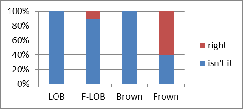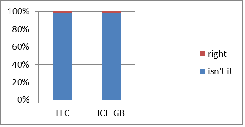Regarding the written corpora used for the analysis, it becomes clear that the question tag isn’t it is more frequent in the two British corpora, LOB and F-LOB. The question tag right is not found in LOB and once in F-LOB. Despite the fact that Brown is an American English corpus, no instance of right is found here, which is an unexpected outcome and could have something to do with the “small” corpus size of Brown. That is why it would be necessary to consult larger corpora to verify this result. With regards to American English of the 1990s, right is the predominant question tag (cf. Table 1 and Chart 1). Thus, the first hypothesis turns out to be valid in the analysis of the written corpora of English and the second hypothesis can only be confirmed in Frown.
isn’t it |
Right |
|
LOB |
12 |
0 |
F-LOB |
8 |
1 |
Brown |
9 |
0 |
Frown |
14 |
22 |
Table 1: The question tags isn’t it and right in the four corpora of the Brown family

Chart 1: Percentages of the question tags isn’t it and right in the four corpora of the Brown family
The results for the spoken British English corpora reveal that the frequency of isn’t it is by far higher than the one of right. Interestingly enough, the raw numbers of isn’t it as well as right double from the 1960s to the 1990s.
The hypothesis that isn’t it is more frequent in spoken British English is thus supported by the results from the spoken British English corpora.
isn’t it |
Right |
|
LLC |
198 |
4 |
ICE-GB |
398 |
8 |
Table 2: The question tags isn’t it and right in the DCPSE

Chart 2: Percentages of the question tags isn’t it and right in the DCPSE
All in all, the results of the analysis of the written and spoken corpora show that isn’t it is used more often in British English, both in the spoken and written variety and that right has a higher frequency in the American English corpus of the 1990s. As the question tag right is not contained in LOB, but does come up once in F-LOB and as the raw numbers for the occurrence of right double from LLC to ICE-GB, it might be possible that right gradually makes its way into British English. However, larger corpora and maybe also the Internet as a corpus would be necessary to find out more about this hypothesis.
This mini-project could not only be extended by the use of larger corpora, but also by the analysis of other variable question tags as for example is it or does(n’t) he/she/it and invariable tags like yeah or innit. Furthermore, the patterns of the questions and prevailing question tags could be focused on.
Created with the Personal Edition of HelpNDoc: Full-featured multi-format Help generator